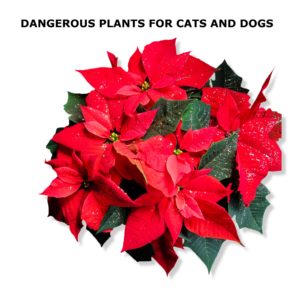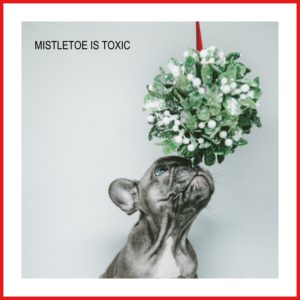 Household pets come in contact with lots of dangerous items every day. Although they have lived in our homes for many centuries, they are still animals, and need us to protect them from the hazards of our world. More than 100,000 companion animals are treated each year for some type of poisoning. One of the biggest reasons for this is toxic plants – either house plants, or items we’ve planted in our yards or gardens. Here are some of the most common ones:
Household pets come in contact with lots of dangerous items every day. Although they have lived in our homes for many centuries, they are still animals, and need us to protect them from the hazards of our world. More than 100,000 companion animals are treated each year for some type of poisoning. One of the biggest reasons for this is toxic plants – either house plants, or items we’ve planted in our yards or gardens. Here are some of the most common ones:
COMMON AT CHRISTMAS
- Poinsettia – Causes irritation in the stomach and mouth if ingested. Not generally life-threatening. Affects both dogs and cats.
- American Holly – Vomiting, diarrhea, difficulty breathing, low heart rate. Toxic to both dogs and cats.
- Mistletoe – cardiovascular collapse, difficulty breathing, erratic behavior, vomiting, and diarrhea. Toxic to both cats and dogs.

COMMON HOUSE PLANTS
- Aloe Vera – Vomiting, lethargy, diarrhea. Poisonous to both dogs and cats.
- Ivies – Vomiting, abdominal pain, drooling, diarrhea. Foliage is more toxic than berries. Toxic to both cats and dogs.
- Lillies – Kidney failure – toxic to cats, non-toxic to dogs. This plant, in particular, is highly toxic to cats and can cause death.
- Asparagus Ferns – Skin rash – toxic to both cats and dogs.
- Jade Tree – Nausea and vomiting – affects dogs and cats
COMMON OUTDOOR PLANTS
- Azalea – Vomiting and diarrhea, possibly life threatening. Toxic to both dogs and cats.
- Daffodils – (yes, spring is coming eventually). Vomiting, diarrhea, convulsions – particularly from ingestion of the bulb. Highly poisonous to both dogs and cats.
- Oleander – Drooling, abdominal pain, lethargy. Life threatening. Toxic to both dogs and cats.
- Oregano – Affects both dogs and cats. Mild gastro-intestinal upset.
If you suspect your pet has ingested parts of any plant, and they are showing symptoms of distress (vomiting, diarrhea, lethargy, pain), call your veterinarian immediately. Although it can be extremely expensive to deal with a medical emergency on a holiday, or on off hours, don’t wait as every minute treatment is delayed means damage to your pet can become permanent. If you’re lucky, like I am, you’ll have a 24 hour non-emergency vet nearby who can take you in immediately and already knows your pet’s history.
If not, use the emergency vet service nearest you. It’s always wise to call ahead and let them know what the issue is. That way the vet can have the treatment ready for you when you arrive. Take a portion of the plant with you. Speaking from experience, we’re not always correct in what we call our plants.
Wishing all the pet parents out there, a happy and, most importantly, healthy holiday season!
For a much larger list of plants that are toxic to house pets, please go to the following ASPCA link – https://www.aspca.org/pet-care/animal-poison-control/toxic-and-non-toxic-plants
Here’s a list of plants that are toxic to dogs: https://www.petmd.com/dog/emergency/poisoning-toxicity/e_dg_poisonous_plants
For a list of plants that are toxic to cats, go here: https://pethelpful.com/cats/Houseplants-Poisonous-to-your-Cats
For more advice about keeping your pets safe and healthy over the holidays, check out my earlier post Pets and the Holidays

